Buzkashi Explained: Rules & Traditions of the World’s Most Dangerous Game
What is “Buzkashi” and how is it played? I’ve had the privilege of witnessing a number of games of Buzkashi and in addition to sharing some of my favorite photos from these experiences, I’d also like to explain the rules of Buzkashi as best I understand them.
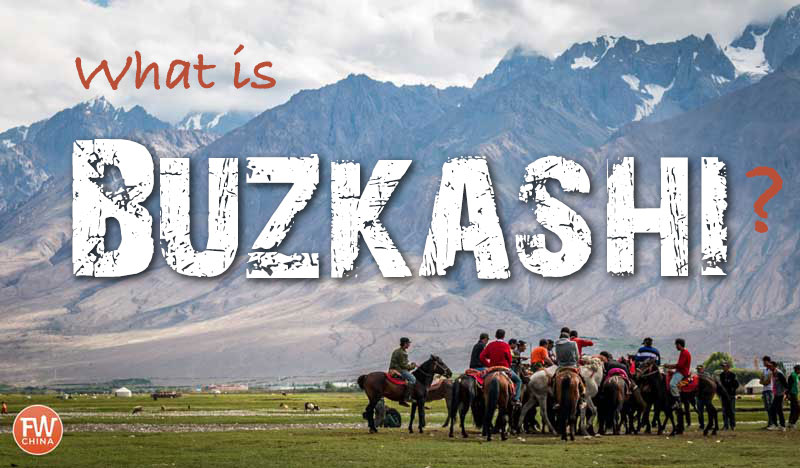
Buzkashi (pronounced “booz-ka-shee”) is a popular Central Asian game that has been around for centuries and yet surprisingly few people in the west have ever heard of it.
My first time to witness Buzkashi occurred while cycling down the Chinese Karakoram Highway in Xinjiang. My friends and I stopped in the small town of Tashkorgan near the border of Pakistan and China and stumbled upon a few games being played.
It. Was. AWESOME!
Armed with my camera and plenty of questions for the locals standing around watching, I was able to better understand the rules and traditions surrounding this mysterious game of Buzkashi.
Here’s what I’ll share with you:
- What is Buzkashi?
- History of Buzkashi as a Sport
- General Rules of the Game
- Different Variations of Buzkashi
- Trivia and Little-Known Facts about Buzkashi
Let’s dive in!
What is Buzkashi?
Buzkashi, translated as “goat pulling”, is a traditional Central Asian game that is played on horseback or yak back. In this game, players vie for control of a headless goat carcass, which acts as the “ball”, in an effort to score points for themselves or their team.
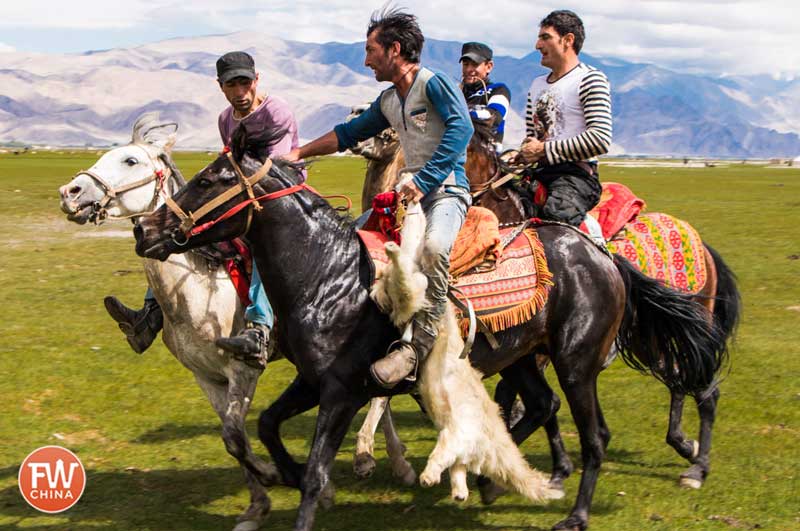
It’s the national sport of Afghanistan, but you’ll find different variations of the game being played all across Asia, including China’s western region of Xinjiang.
Many have called this the “most dangerous sport in the world” and after you see how it’s played for yourself, I’m sure you’ll agree!
Don’t miss the rest of this season! Subscribe to FarWestChina on YouTube.
Sadly, as horse ownership becomes less common, the sport of buzkashi seems to slowly being disappearing.
History of Buzkashi as a Sport
Legend has it that the game of Buzkashi was first invented centuries ago when Afghan tribes would gallop up on horseback to steal a rival tribe’s goats from their flock.
Both defensive and offensive strategies were used which developed into a formalized game whose rules are to this day a bit mysterious.
The game migrated across Central Asia where it has been adopted by a number of different ethnic groups including the Kazakh, Tajik, Kyrgyz and many more.
The name Buzkashi literally means “goat pulling.”
Each ethnic group has their own special way of playing Buzkashi, and there are a number of different facets of the game that change depending on where you are.
These changing parts of the game include:
- The “Ball”: In most cases it’s a headless goat carcass, but some groups also use a calf or a sheep carcass. I know some people who get offended by this. It’s really no different than our basketballs or American footballs that are made out of other animal hides.
- The Transportation: Most games are played on horseback, but it can also be played on yak back.
- The Field: While in some cases Buzkashi can be played on an officially marked field, often it is played on an open field with no boundaries.
- The Team: In some countries it’s two teams against each other; in others it’s every man for himself.
- The Objective: For some games, the objective is to get the goat carcass in a hole, others in a basket. Some ethnic groups need to get the goat around a flag or into a designated area.
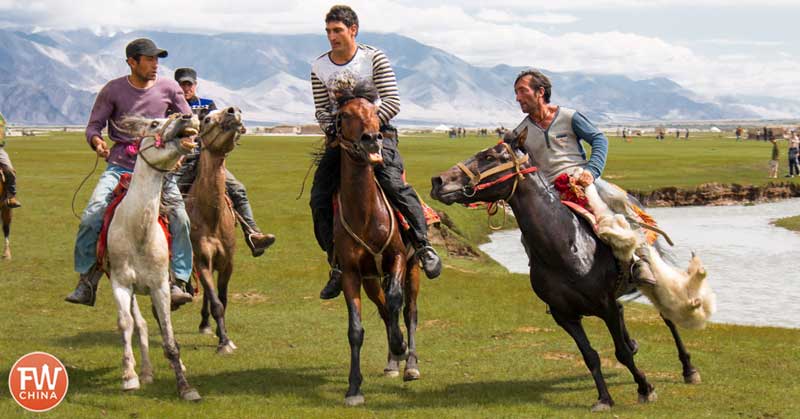
As you can see, there’s a lot that changes from country to country with the game.
For this reason it’s difficult to define the “rules of Buzkashi”… but for some reason I’m going to be foolish enough to try ;)
General Rules of Buzkashi Explained
No matter which version of Buzkashi you find yourself watching, the basic gist of the game remains the same:
Players on horseback (or yak) are struggling to take control of a headless goat carcass in an attempt to drag it to a designated hole/flag/zone.
That’s it. The number of points needed to win or the number of games played in a match isn’t set (something I’ll go into in more detail next).
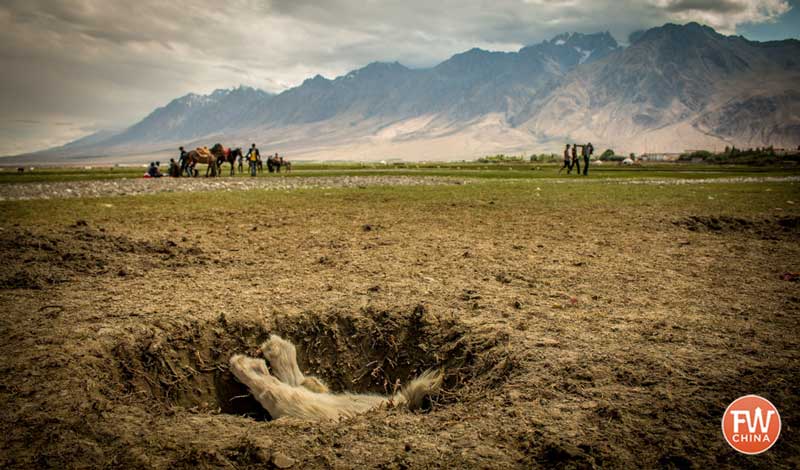
While most games throughout the plains of Central Asia aren’t governed by a referee, there are still a few rules that players expect others to abide by:
- Players cannot attach the goat carcass to their saddle; all 100+ lbs must be held by hand or wrapped by the leg.
- Players must remain on their horse/yak at all times to be eligible for play.
- Players may whip their own horses and those of their opponents, but they cannot hit opponents in an attempt to knock the carcass out of the grip of their hand or leg.
Other than these rules, it seems that most anything goes.
Players and horses often walk away from games bloodied or worse (think broken bones, dislocated shoulders, etc.).
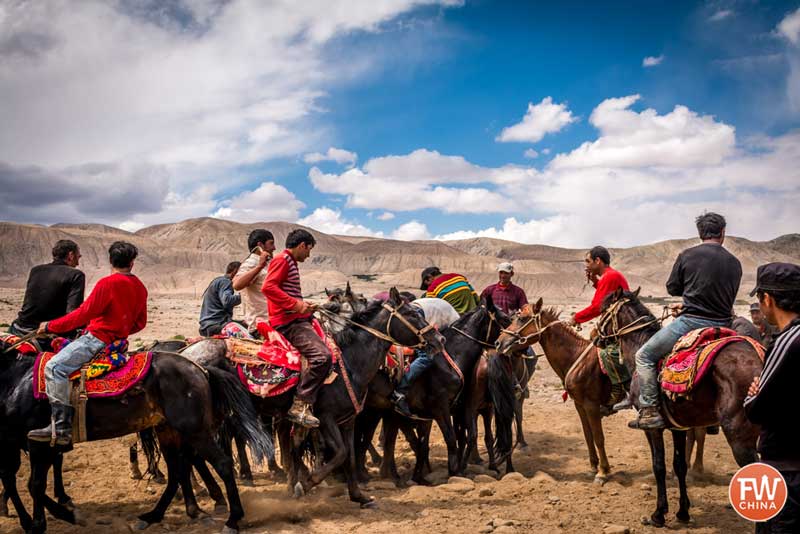
For this reason, it has been said that “this is what polo would look like if played in prison.”
Different Variations of Buzkashi
Different ethnic traditions govern the playing of Buzkashi throughout Central Asia.
In some countries like Afghanistan, the games are very formal and often involve the sponsorship of teams or individual players by a wealthy benefactor.
Each player who scored a point was awarded a monetary prize…”
In countries like Tajikistan or among the Tajik people of Tashkorgan in China’s Xinjiang region, the games are more often associated with a wedding. As part of the festivities, the father of the bride is often expected to sponsor games of Buzkashi.
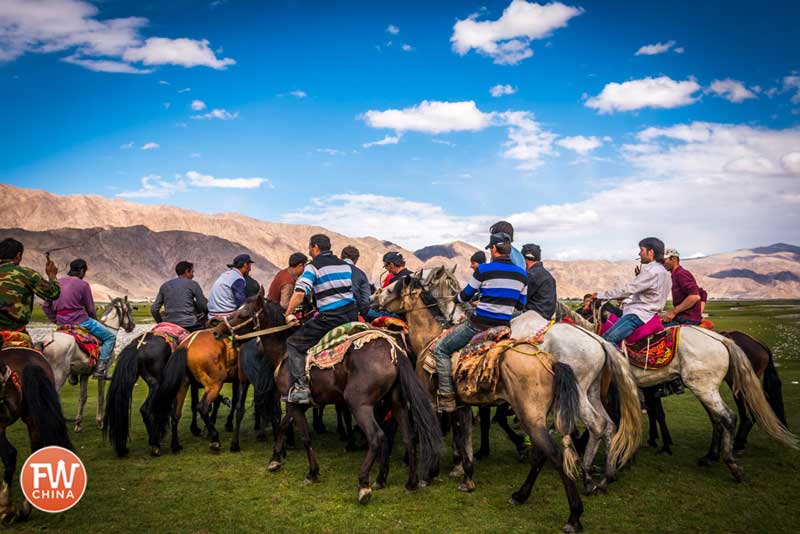
The games that I personally witnessed were part of a local wedding. The father had put up about 5,000 RMB (US$850 at the time) per game, with each point being worth 500 RMB (US$85).
Each player who scored a point was awarded this monetary prize, and whichever team scored the most points was awarded a larger prize such as a TV, refrigerator, or washing machine.
In such a case, the number of points needed to win or the number of games being played is all dependent upon how much money the game’s benefactor– be that a bride’s father or a wealthy member of society– is willing to donate.
Trivia & Little-Known Facts About Buzkashi
In some places, a Buzkashi match can last for days…”
The game of Buzkashi isn’t very well known in general, but there is some fun trivia surrounding the game that I think you’ll find interesting.
For example, did you know that…
- The name “Buzkashi” literally means “goat grabbing” when translated into English.
- Buzkashi was featured in Rambo III (1988) when Sylvester Stallone was actually seen playing the game.
- When the Taliban came to power in Afghanistan, they banned the game of Buzkashi.
- In the 1940s, a group of men in Cleveland, Ohio introduced a version of the game in the United States. They called the game “Kav Kaz.” It only lasted for less than a decade.
- Before the game, the goat carcass is often soaked in water for 24 hours in order to toughen the skin and make it harder to tear when players pull in opposing directions.
- In some places, a Buzkashi match can last for days.
- The horses are more valuable in a game of Buzkashi than the player himself. In some cases, a horse may be trained for up to 5 years before playing its first game.
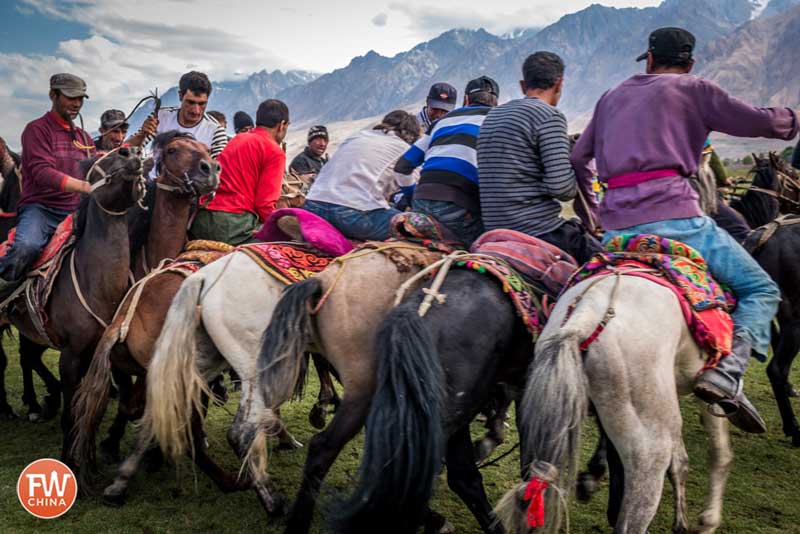
Final Thoughts on Buzkashi
If you have a chance to experience Buzkashi on your own, I definitely recommend you seize the opportunity!
It’s not only fun to see the game being played; it’s also great to be a part of the group of spectators that gather for the games.
For us in Tashkorgan, it was the perfect blend of gorgeous natural scenery (grasslands and mountains), fascinating culture (Xinjiang Tajik), and the traditional game of Buzkashi.








Hi Josh, Thank you very much. That is a terrific piece. Sure, I’m not bad on a horse, but I would be highly reluctant to play this game! Cheers, Rob
Josh Summers on September 24th, 2015 at 4:01 am
Thanks for the comment, Rob! I saw a documentary where a professional polo player tried playing with some Afghanis. He said it was one of the hardest things he had ever done. :)
I would like to see the skills of these horsemen up against the cowboys in the US. Who will win?
Josh Summers on September 27th, 2015 at 10:27 pm
Ha! Who knows…they are two very different skills in my opinion ;)
Hi Josh, excellent video and notes. However, I reckon I saw nearly as much action and fun (and some of that was scary/dangerous) at the Sunday Livestock Market at Kashgar a few weeks ago …. :-)). Cheers, Graham
Thanks for teaching me about good sport of Buzkashi. I would love to visit Afghanistan and try a round. Thanks again Josh.
Josh Summers on May 3rd, 2016 at 4:36 am
My pleasure! Glad it was a fun read :)
Good article im originally from kabul Afghanistan
could you pleas send to me some photo abaut buykashi in my grmail adress
thanks very much abaut your nice website
Seen buzkashi during Navruz in Dushanbe. Some of the most amazing riders I have ever seen. So lucky to have been able to witness this sport! Great memories!
Josh Summers on September 19th, 2016 at 10:42 am
Awesome! I’m so glad you had an opportunity to witness it. It is a ton of fun to watch.
Hey Josh,
I’ve lived in Central-Asia for 13 years and I want to thank you for your accurate description of buzkashi.
Josh Summers on October 19th, 2016 at 8:11 am
My pleasure! I’m glad you approve ;)
Thank you so much ! Your site is so educating and I’m glad I found it.I born and raised in Central Asia, I look forward learning all these beautiful traditions ! Happy New Year! Wish you the best!
Josh Summers on January 5th, 2017 at 1:43 pm
Thank you! Happy New Year to you as well ;)
My guess is… If you took the roughest toughest American or Australian Cowboy and gave him (yes…. him, don’t see many women excelling at this), gave him 6 months of 3-4 days a week training, you would have a reasonable player. I don’t think you could make a roper out of the Afghans in the same time, BUT!!!, I do think you could make a bull rider, bronc rider, or a cutting horseman out of them in that time. just mho.
Josh Summers on January 15th, 2018 at 12:29 am
Haha! Maybe so…who knows. I’d love to see somebody try, though :)
I feel very bad for the horses because in some of the images I’ve seen the horses mouths are bloody and destroyed. I would not like to go watch this event (which you call enjoyable) because it make me feel sick to watch people abuse their horses and whip other horses that have no control over the situation. I can’t believe that people would want to play this so called game.
Josh Summers on February 10th, 2018 at 8:09 am
You’re not the only person to feel this way, and I completely understand. It’s an age-old game that has been played for generations in this part of the world.
2003 Kabul
I could not understand why the crazy Americans wanted to see a goat dragged with horses. I certainty wouldn’t enjoy anything so barbaric! But I decided to se the goat grabbing over the cock fights.
Oh my. What a magnificent gsme. One game and I can feel the barbarism filling my veins. I couldnt get enough before i had to go back Texas.
I am headed back this spring!
woah, that’s cool
Josh Summers on March 14th, 2018 at 4:20 am
I know, it really is!
I am going to talk about buzkashi the day after tomorrow I learned many things from your site
Thank you so much
Josh Summers on June 28th, 2018 at 4:45 pm
My pleasure. I’m glad it was helpful!
A few comments on here about US cowboys playing this and how good they’d be. USA entered a team in the competition at the World Nomad Games in Kyrgyzstan for the second time this year and got roundly thrashed by the central Asian teams (Though they did better this time than last games). So I’m afraid the claims for cowboys acing it after 6 months practice are a bit wide of the mark. They did get a warm welcome though. Which was great to see.
This is an incredible sport.